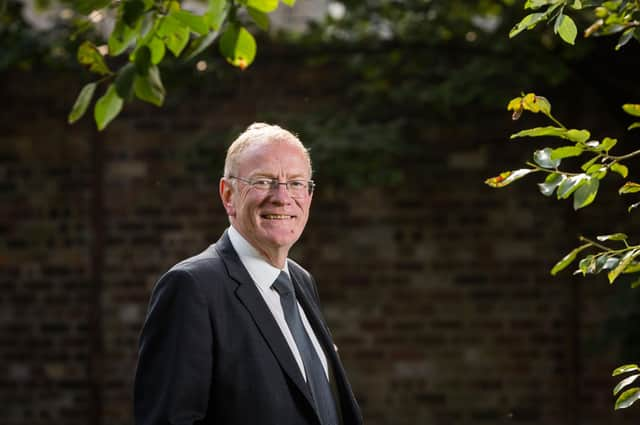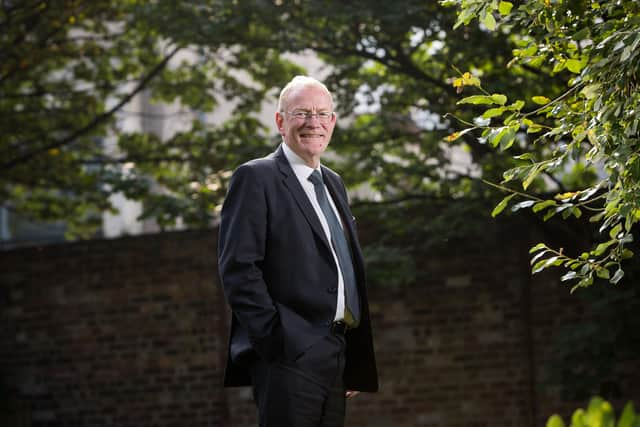The Big Interview: Jock Millican, founder and director at Equity Gap


The former Scotland rugby international is also chair of Linc Scotland, the national angel capital association, and a court assessor at the University of Edinburgh. Equity Gap members currently invest in 32 companies, leveraging more than £70 million in total investment into this portfolio.
How has Equity Gap and its portfolio been able to function during the Covid crisis? I see you’ve said your angels have been busier than ever. What have been the main challenges?
Advertisement
Hide AdAdvertisement
Hide AdThe team has been on hand to support as well as react to a very fluid funding landscape. Many of our portfolio have used the time to accelerate strategic decisions, pivot products and services to meet unexpected market demands and create new opportunities.


We have used both Scottish and UK government funding initiatives, and helped the companies to understand, apply to and secure the various schemes. We were also pleased to finalise a significant investment into Trojan Energy, an Aberdeen-based electric vehicle charging point business, reflecting our growing focus on cleantech.
Ongoing support for early-stage businesses from investors is reflected across the community in figures from Linc Scotland. Deal numbers for the first nine months of 2020 show a 40 per cent increase by value compared to 2019. While most of these funds have gone into existing portfolio companies, the number of new investments is roughly in line with previous years. Our own deal flow echoes this trend.
During the crisis, the response from our companies has been amazing, and the innovation demonstrated in the face of adversity exemplary. One of our portfolio, QikServe, offers flexible, touchless ordering and payment solutions to the hospitality sector and its customers. Its "order at table” and “pay at table” software is ideal for Covid-restricted bars and restaurants and they have experienced a huge increase in demand as the sector strives to stay commercially viable.
There’s also Appointedd, offering online booking software to businesses. It has seen significant demand from retailers seeking to re-engage customers. The team was able to quickly adapt and deploy its technology to provide secure scheduling tools. It also used its technology to work with the NHS and the public sector to schedule flu jabs, occupational vaccinations and testing services.
The angel network is very collegiate, working together on individual investments as well as wider industry issues. As chairman of Linc Scotland, I have worked with industry colleagues to lobby governments hard to highlight the needs of the sector, especially where funding schemes like the Coronavirus Business Interruption Loan Scheme and Future Fund did not apply to pre-profit and, often, pre-revenue start-ups. Noticeably, later schemes including Bounce Back Loans and the Early Stage Growth Fund addressed many but not all the gaps we identified.
Determination
I was also one of those consulted by technology entrepreneur Mark Logan when he produced the Scottish Government report, Scottish Technology Ecosystem Review. It’s a good report and from our perspective highlights how angels can contribute to the talent and the ambition of the tech sector. It’s pleasing that the government agreed to implement the recommendations in full. Some of them, particularly education, will require real determination to achieve, but will create a sustainable ecosystem.
The development of entrepreneurial skills recommended by the Logan Review is applicable to all high-growth sectors. And it is important that equal emphasis is given to sectors such as life sciences and clean energy, especially where Scottish technologies are among the best in the world.
Advertisement
Hide AdAdvertisement
Hide AdUniversities are a key part of the recommendations from the Logan Review. I am also a court assessor (essentially a non-executive director) at the University of Edinburgh and use my experience to support the commercialisation of university spin-outs. There are many exciting companies emerging, like this year’s winner of Converge Challenge, Earth Blox, a start-up run by Genevieve Patenaude.
I believe a critical review of the curriculum at secondary and tertiary level will ensure that Scotland produces the next generation of entrepreneurial graduates whose skills will be the engine for growth. There is a huge number of research and development ideas generated in our universities and we must encourage their commercialisation through spin-out, licencing or other means. This in turn will help sustain our universities.
You have said entrepreneurs and new businesses must play a key part in rebooting the economy – can you explain more about this?
Post-Covid economic recovery and Scotland’s future growth will come from entrepreneurs with original, disruptive ideas. Our support for them is how new businesses, jobs and skills will be created.
For instance, one of the key issues facing our world is climate change. Ahead of COP26 in November 2021, start-ups like Sunamp whose heat battery technology is already delivering cheaper, greener thermal energy storage to homes and businesses across the UK, or Trojan Energy which is hoping to bring the reality of kerbside electric vehicle charging a little closer, are making a measurable difference.
Both demonstrate that we can not only innovate to meet the challenges ahead but also how vital it is that business angels continue to support companies that can have a fundamental influence on our economy and the world’s climate.
How is Brexit going to affect the business and what measures are you planning to take?
We might struggle to see how the economy will ever grow again, with escalating lockdown measures and fading government stimulus, especially as Brexit looms large. Of course, the recovery will be affected by our new trading arrangements with Europe. The current challenge is that we don’t know whether there will be a deal or not, and if there is, what shape it will be.
Advertisement
Hide AdAdvertisement
Hide AdMost of our portfolio, although not all, export to Europe and the rest of the world. Others rely on importing supplies from overseas. Any disruption to export or supply routes, or increased tariffs will have major consequences.
Similarly, many benefit from the talented pool of EU nationals attracted to our universities, that stay post-qualification to pursue quality career opportunities. Closing borders will become an issue.
We are already scenario planning, taking steps to mitigate the impact where possible. In some cases, setting up subsidiaries in Europe, for others ensuring that paperwork is ready for import or export, and in others buying in additional stock to allow for initial disruption. It’s clear that all businesses are presently operating against a backdrop of uncertainty, and we’d all prefer clarity to plan.
Can you summarise how and why you started Equity Gap, and how you feel about it recently celebrating its tenth anniversary?
I set up Equity Gap in 2010 with 15 members – mainly friends and colleagues – who wanted to put something back into the Scottish economy. Our aim was to help companies grow, hopefully make a return on our investments, and have some fun along the way.
Having celebrated our tenth anniversary, the now 150-strong membership has invested more than £20m into a 32-strong portfolio, generating over 400 jobs. The Scottish Co-Investment Fund has helped to build the portfolio, matching most of Equity Gap’s investments. This combination of private and public money has meant that more companies are supported for longer.
In the early days, Linc Scotland supported us with funding from the European Regional Development Fund. Hopefully the Scottish Government will continue this role, supporting new syndicates that emerge, especially as angels continue to play a disproportionate role in backing start-ups as they mature.
Apart from six months in 2011 when I stepped in as chief executive at the Scottish Rugby Union, I have been fully involved running Equity Gap. Fellow director Fraser Lusty joined at that time and we now run the operation together with a team of five.
Advertisement
Hide AdAdvertisement
Hide AdWe have certainly put something back into the economy and the help, advice and network that we offer to start-ups is one of the most enjoyable parts of being a business angel.
What are the chief business goals and aims over the coming year, and beyond to another decade down the line?
Maintaining our ethos – to be the most inclusive and accessible angel group in Scotland – is key to our member appeal. We are also developing our succession planning to ensure the team continues the Equity Gap philosophy.
As we move into our second decade, hopefully we’ll start to see a return on investment for our members. We haven’t exited any of our portfolio yet. That’s why it’s called "patient capital”. It takes time to build companies of profitability and scale and they need our investment if they are to create wealth, job opportunities and the future recovery we all hope for.
What has been the most pivotal moment in your career?
Breaking my leg playing rugby in my final year at the University of Edinburgh. I couldn’t get a job with my leg in plaster, so I did a one-year brewing degree. The rest, as they say, is history.
A message from the Editor:
Thank you for reading this story on our website. While I have your attention, I also have an important request to make of you.
The dramatic events of 2020 are having a major impact on many of our advertisers - and consequently the revenue we receive. We are now more reliant than ever on you taking out a digital subscription to support our journalism.
Subscribe to scotsman.com and enjoy unlimited access to Scottish news and information online and on our app. Visit https://www.scotsman.com/subscriptions now to sign up. By supporting us, we are able to support you in providing trusted, fact-checked content for this website.
Joy Yates
Editorial Director
Comments
Want to join the conversation? Please or to comment on this article.